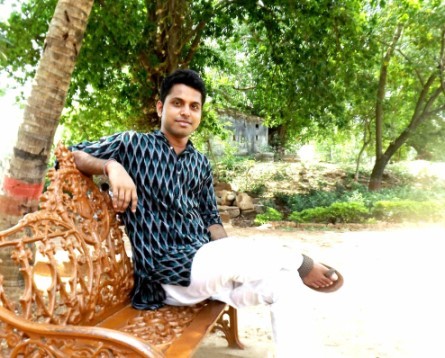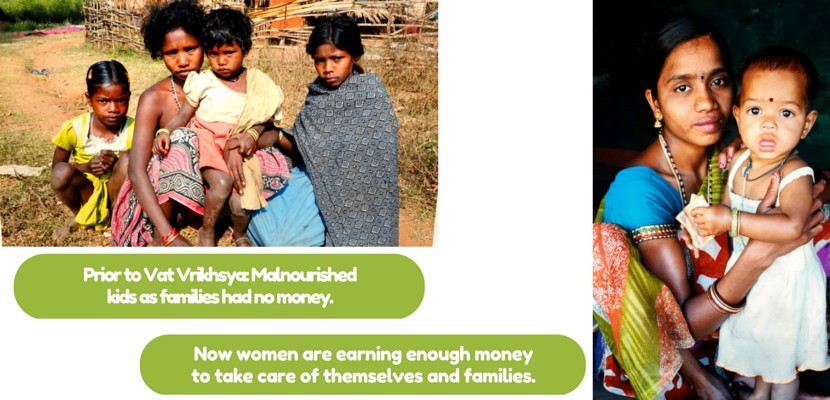 Hi Vikash and welcome to our inspiring startup talks with entrepreneurs! Firstly, can you please tell us a bit about yourself?
Hi Vikash and welcome to our inspiring startup talks with entrepreneurs! Firstly, can you please tell us a bit about yourself?
I belong to a small town in eastern state of India named Odisha. Hailing from a small town and growing amidst the tribal communities, I have always witnessed the good and the bad things that prevailed in the society. I have always wondered why the tribal people are being treated inhumanely by our mainstream society. When I was a child, I wondered why my family restricted me from playing with the tribal kids, touching them or having breakfast with them. They were treated as untouchables because they belonged to the lower class of the society. I have been fortunate enough to receive good quality education and I completed my Masters in Software Engineering. I was working for a top notch IT MNC but then I asked myself what I have done to this world. I realised that I came to this world to serve some purpose and so I decided to start Vat Vrikshya so that I can work closely with poor, vulnerable tribal communities
Can you tell us about the Adivasi tribes and their lives?
Adivasis are indegenous or original inhabitants of India.Literally "Adi" means earliest time and "Vasis" means resident of. They have a rich culture and traditions. They are innocent people who believe that nature sustains them and in return they ought to protect forest and the mountains that they dwell on. Both the land owners and the bonded laborers in remote regions which lack basic amenities. They are living life of destitution. The major problems that these tribal communities face are geographical isolation, unemployment, landlessness , illiteracy, malnutrition, health problems, sanitation and unprofitable agriculture, exploitation by middlemen, traders and money lenders.

What inspired you to quit a lucrative job and work towards the betterment of the Adivasi tribes?
I realised that professional success doesn’t necessarily lead to happiness or fulfilment. This has been a huge realization. Like many people, I was programmed early in life to achieve. I had a dream job, owned high tech gadgets , expensive fancy apartment and had all the luxuries a 26 year old could possibly imagine. But after witnessing the plight of tribals in my region I asked myself the fundamental questions of my life - " Why am I here?" and "How will I measure my life?" Rather than sitting all day long in the office, making an MNC richer, I wanted to do something meaningful in my life. These Adivasis have lost their land and livelihood. They are physically isolated from mainstream society and have no access to markets to sell their products. Tribal children are malnourished and have no access to education. So after working for four years, I decided to quit my job and work for these marginalized groups. I had no concrete plans but I was confident of making a difference in the life of these tribal people.

Despite oppositions from your family and friends, why did you think it was important to get involved and bring a change to their (Adivasi tribes’) lives?
I have always wondered why there are problems in our society, discrimination based on caste, class, stature and why the God isn't doing anything when he could do something about it. I got the answer as why cant we be the change which we could bring in.
Rather than reading, watching or complaining about this issue, I thought that it was the time for me to make a difference and contribute to the larger picture of getting such tribal community to be a part of the mainstream society. Having this as a notion, I took an initiative which would go on to redefine my goals in life and provide a new picture on how I look at my future. Bracing stiff resistance from parents, society and of course friends, I moved ahead in my pursuit to build a better India. I knew I had to work in rural India, helping thousands of people who are talented but can’t join the mainstream due to lack of training and proper resources. My parents were worried how I could live without a stable income and that too in remote villages without any basic facilities. I could not convince them initially. Though it took its own fair share of time, at the end of the day it was their son’s emotions which won his parents over.
How did you get the idea of setting up ‘Vat Vrikshya’?
"Vat Vrikshya" in sanskrit means Banyan Tree. Banyan tree is the national tree of India and is considered one among the most sacred trees in India. Just as how a Banyan tree provides shelter to a little or larger creature underneath it, our organization aims at bringing marginalized, vulnerable tribal groups under the umbrella of our vibrant democracy to provide equal opportunity so that they could be the part of the India's much talk about Growth Engine. We have not set up an office yet. Banyan Tree is still the focal point and the gathering place for our local councils and meetings. As I was raised in a small town and so I got a chance to meet the people belonging to tribal communities from near by villages and I was aware of their problems. Somehow I couldn't connect with them and I felt as if was looking at their problems from the glass of wall. I was analyzing their problems I wasn't able to understand or feel what they were going through. And that's when I decided to live a life of poor for 2 months in their village. I could look into their eyes and understand what their real grassroot problems were and analyse better what could I do to make their life better. For the first time in life I felt deep hunger and it was devastating and frustrating. I personally learned a lot from that experiment. I learnt that material possessions don't guarantee happiness and that we should be grateful to God for giving us what we have today rather than complaining and craving for more. While we are blessed to have an option to choose which food to eat, there are many who lead their lives with no options at all - starving for food. When it comes to our social venture, we could solve the problems better when we face the problems ourselves as adversity is the mother of invention.

How did you go about the process of building this self-funded organisation?
Initially we donate 2000 INR to prospective women of every family in the village. They add 2000, 100, 500 based on their capability to their alocated fund. If anyone needs further capital, then we provide money from our fund; alternatively, we help them getting loans from banks. Our team regularly guides them, tracks their activities. Initial capital was less, but the skills that they possessed have paved way for them to make 3 to 4 times the profit. 10 pc of the earned profit goes to Vat Vrikshya fund which is again maintained by few representative women from tribal communities for organizing weekly Mahila Sangh (Women Club) where in they are provided vocational trainings, trainings on marketing the products and knowledge sharing. 40 % of our profit goes for children and adult education in thse communities. Ours is not an NGO but a social business organisation where we make profits and we utilise our profits (fund) for the wefare of tribal communities. We use our money for helping women to get advanced machineries, giving interest free loans from our fund to women, who need money for their business, free medicines and free books for their education. We really don't believe in accepting donation from any organisation or people. We believe in the principle of earning rather than receiving money from donors.We are a self sustaining organization.
What is the key learning from your entrepreneurial career?
There are so many lessons that I have learn over the years and I still continue to make mistakes and learn from them and I think that’s a key learning point in itself! Here are a few:
a) ‘No one’s going to do it for you.’ – ’no one says it has to be that way.’ One will be all by himself/herself when they intent to start a startup. He/she might have a good family, a good life partner but at the end of the day one has to do it all alone.
b) Be very clear on what you want and focus on that. Focus on one thing at a time and don't take hasty decisions out of hurry.
c) Willing to learn and seek more information. I may be already know a great deal but now I realised that no one knows everything and we can learn valuable information from others.
d) Do what you love. It's inevitable that one would come across people who would scare and bring one's morale down. But one should stay committed to what he/she is doing. If one is not passionate about his or her own work then how can he expect people to believe in his work. I always think about this popular business saying:
 If your mind can conceive it, and your heart can believe it, then you can achieve it!
If your mind can conceive it, and your heart can believe it, then you can achieve it!
Why do you think it is important for the youngsters to get involved in social entrepreneurship?
Every society, every country has its own set of problems. In today's life, your are facing critical problems both socially and environmentally, to name a few; climatic changes, global poverty, food crisis, shortage of oil and the list go on. We as youngsters can be part of that solution. The future of a country or society relies on its youngsters. The youth have the passion and energy, the strategic social positioning, and the natural tendency towards problem-solving. So youth should take up these socio-economic problems as challenges and opportunities and come up with innovative solutions, contributing directly to a social cause.
Over the last three years, I have researched to figure out that the best way I could do my part and I am informed to say the best thing I can do is to start or be the part of social enterprise. It leverages commercial principles to maximize improvement on human and environmental well being instead of maximizing profits. This is the idea of business for good.

What would your tips for the aspiring social entrepreneurs be?
1) Identify a problem that may be social or environmental problem. Then be passionate about solving that problem because your passion will help driving others passionate towards your cause.
2) Find "Superstars" who will help you make this happen. They should be equally passionate about your cause and be the part of your team.
3) Determine your social business model and give it a shot. Business model need not be perfect at first instance. The process has to be iterative.
4) There is no ideal time to start a social business. Give your idea a shape right away. Most aspiring young entrepreneurs often think
that they are young and they should earn money for themselves first and then do a social business.
5) Accept from your failures and learn from mistakes: At this young age you have very little to risk. This is your chance to grow and develop. Learn from people, listen to customers, listen to partners and accept criticism in a positive way.
6) Don't be an island - island never grows. There is always a scope of growth. As a social entrepreneur, there won't many people who would be like you. You are unique. You have to make sure you bring in peers, experts, professors, advisors into the organization, get their help at every step of the way because with their help you could grow. Scale up your enterprise.
What do you think is the most important quality that one must possess in order to become a successful social entrepreneur?
- Ability to plan and executing those plans properly.
- Looking problems as opportunities and coming up with innovative ideas to solve social problems.
- Be transparent and honest to your stakeholders, partners and customers.
- Making social impact on a larger scale should be the main objective of a social entrepreneur but not money.
- Last but not the least one should be risk averse.
Is there anything else that you would like to add?
Five or ten years from now I hope social entrepreneurship isn't just an industry of a few. Being social entrepreneurial is something that can be part of everyone of our life from CEO of big company to every teacher to doctor or a professional hockey player. We can all work to create creative and innovative solutions to not only create new businesses but shape businesses, to think about creating wealth not just for our shareholders but creating wealth for everybody.
For a lot of people, what one needs to startup is a lot of venture capital. Of course you need money when you start growing. A lame excuse is I couldn't fund my idea because I didn't have venture capital on board. Did I have pockets full of money? I would say no but I was able to do this because I loved what I did.
What do you think sets you apart from your competitors? What is your unique selling point for the services that you offer?
We bring in authentic eco-friendly art forms , crafts , fabric produced by artisans from tribal communities in rural Odisha. We help physically isolated tribal communities to have access to markets and make a living and sustain the native crafts and handicrafts. The items we market are work of expert tribal women with skills attained by tradition and age old practices. The medicines and beauty products made from wild leaves, fruits, roots in a traditional way are highy effective and are in greater demand in market. Our collection is acknowledged for its creativity, design and exclusive products that are beyond comparison. An ecstatic collection of hand-woven sarees designed in vibrant ecofriendly natural colours and distinct style to suit our customers' requirements. We eliminated middle men and tradesmen from our business hierarchy and helped these tribal women to directly deal with customers and we were able to deliver our products at cheaper rates compared to our competitors. Our venture aids local communities and tribes in promoting and creating lively hood. Through our business we ensure ancient artwork and native talent does not fade away due to ignorance of the artisan generation in India. Every penny of our profit goes to the tribal children's education and empowering women in remote tribal villages.

Where do you hope to see your business in the next 10 years?
Tribal culture is rich and unique but they are facing serious threat of cultural extinction, and it is important to preserve them. Our organisation aims at doing all the development works, strengthening their roots, their unique culture of living in harmony with the nature, which has sustained them for 3500 years on this land. We are planning to set up a tribal research lab in collaboration with our state goverment to attract more students into research in this area.
Ten years down the line we endeavour to globalize traditional tribal craft work. These traditional genuine art works are cultural heritage of our country and hence must be promoted worldwide.
Finally, I want the youngsters of this world to be the job creators rather than being job seekers; they should be problem solvers rather than the incessant complainers. I want to open up a consulting company which could attract more youths to social entrepreneurship and help them in all possible ways such as connecting them to potential investors, helping them in resolving social problems and creating business models, creating meaningful partnerships and networks with mentors from NGOs and social business enterprises - finding ways to sustainability. Actively engage with schools and universities to nurture the culture of entrepreneurships among students.
Thanks Vikash for sharing your inspiring social entrepreneurial journey with us. We wish you great success!
INSPIRED? SHARE YOUR STARTUP INSIGHTS WITH OTHER ENTREPRENEURS!
 Have you been actively involved in a social enterprise?
Have you been actively involved in a social enterprise?

What tips would you give to other entrepreneurs who wish to pursue social enterprise?
 Sindhu Chandrasekaran is a very confident and enthusiastic journalist who loves to take up responsibilities and challenges. My quest for learning and keeping myself abreast of any developments in the field have been a drive to experiment new things. Both, the interest that I have in meeting new people, make connections and flare for writing that I am blessed with has moulded me into what I am today. You can follow Sindhu on Twitter or connect with her on LinkedIn.
Sindhu Chandrasekaran is a very confident and enthusiastic journalist who loves to take up responsibilities and challenges. My quest for learning and keeping myself abreast of any developments in the field have been a drive to experiment new things. Both, the interest that I have in meeting new people, make connections and flare for writing that I am blessed with has moulded me into what I am today. You can follow Sindhu on Twitter or connect with her on LinkedIn.